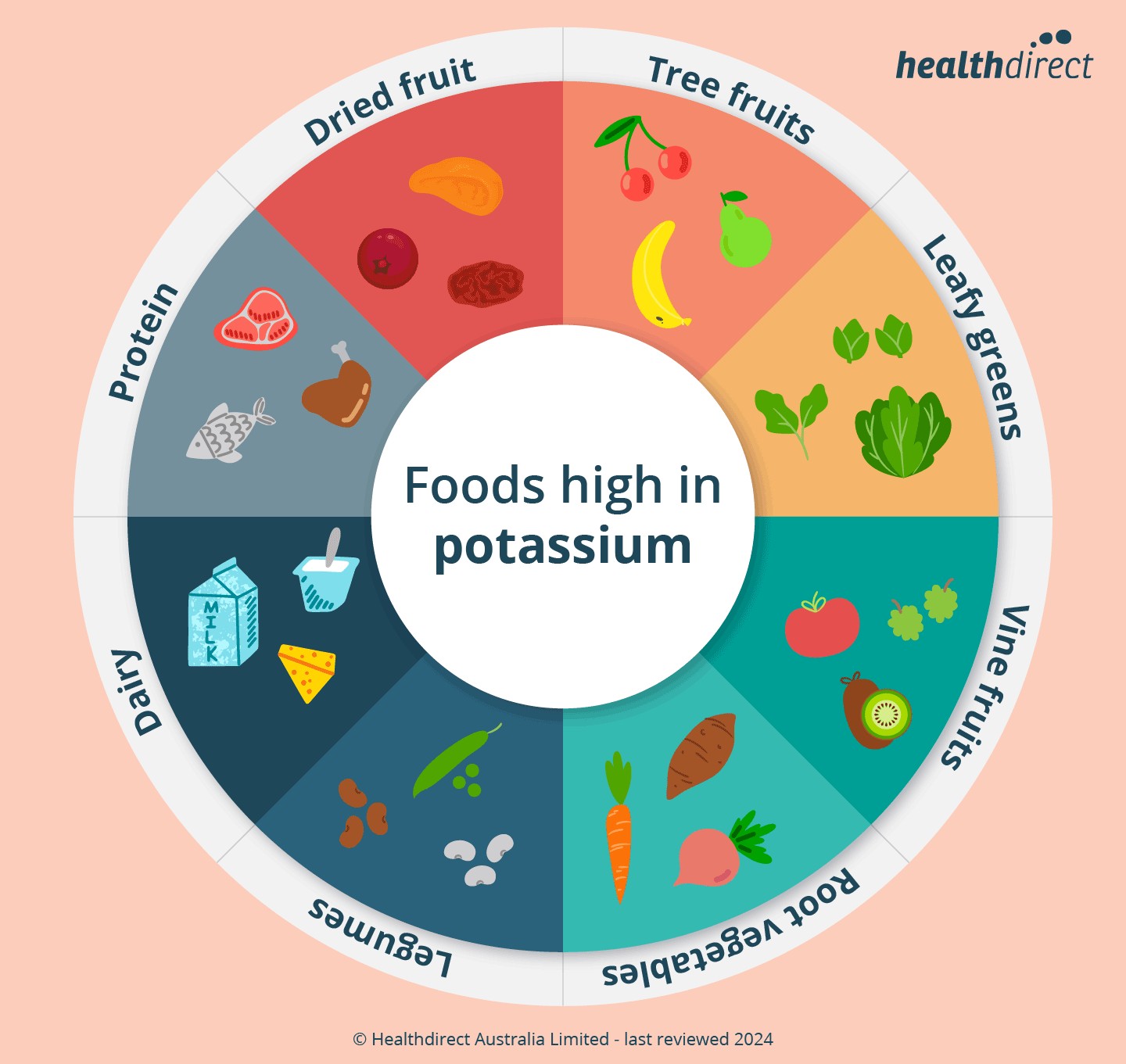Potassium is a vital mineral that plays a crucial role in maintaining overall health. It supports nerve and muscle function, regulates heart rhythm, and helps transport nutrients into cells while removing waste. While most individuals obtain sufficient potassium through a balanced diet, understanding which foods are rich in this essential nutrient is key.
Understanding Potassium and Its Importance
Potassium is an electrolyte that helps regulate fluid balance, muscle contractions, and nerve signals. It also helps maintain normal blood pressure. Potassium works in concert with sodium to manage the body’s water balance. Ensuring adequate potassium intake is essential for preventing health issues related to deficiency or excess.
Food Sources Rich in Potassium
A variety of foods contain significant amounts of potassium. Incorporating these foods into your diet can help you meet your daily potassium requirements.
-
Fruits: Many fruits are excellent sources of potassium.
-
Bananas: Perhaps the most well-known potassium-rich food, bananas are convenient and readily available.
 Close-up of ripe bananas showcasing their potassium content.
Close-up of ripe bananas showcasing their potassium content. -
Avocados: This creamy fruit is packed with potassium, as well as healthy fats and fiber.
-
Oranges: Known for their vitamin C content, oranges also provide a good dose of potassium.
-
Apricots (fresh and dried): Apricots, especially when dried, offer a concentrated source of potassium.
-
Cantaloupe: This melon is a refreshing and potassium-packed choice.
-
-
Vegetables: Several vegetables are high in potassium.
- Sweet Potatoes: A versatile and nutritious vegetable that provides a significant amount of potassium.
- Spinach: This leafy green is rich in potassium, vitamins, and minerals.
- Potatoes (with skin): Potatoes, particularly when eaten with the skin, are a good source of potassium.
- Beet Greens: Often overlooked, beet greens contain a high concentration of potassium.
- Tomatoes: Whether fresh, canned, or as juice, tomatoes contribute to your potassium intake.
-
Legumes: These plant-based protein sources are also rich in potassium.
- Beans (White, Kidney, Lima): Beans are an excellent source of potassium and fiber.
- Lentils: Another great option for increasing your potassium intake.
- Peas: Green peas provide a good amount of potassium along with other essential nutrients.
-
Dairy: Dairy products can also contribute to your daily potassium intake.
- Milk: A good source of potassium, calcium, and vitamin D.
- Yogurt: Especially Greek yogurt, which often contains higher levels of potassium.
-
Fish: Certain types of fish are high in potassium.
- Salmon: This fatty fish is not only rich in omega-3 fatty acids but also provides a good amount of potassium.
- Tuna: Another excellent choice for increasing your potassium intake.
- Halibut: Halibut offers a significant amount of potassium per serving.
Recommended Daily Intake of Potassium
The recommended daily intake of potassium for adults is around 3,500 to 4,700 mg. This can vary based on individual health conditions and activity levels. Consulting with a healthcare professional or registered dietitian can provide personalized recommendations.
Potential Risks of Potassium Deficiency and Excess
Maintaining proper potassium levels is crucial. Both potassium deficiency (hypokalemia) and excess (hyperkalemia) can lead to health problems.
- Hypokalemia (Potassium Deficiency): Symptoms can include muscle weakness, fatigue, heart palpitations, and digestive issues. It can be caused by certain medications (like diuretics), excessive sweating, vomiting, or diarrhea.
- Hyperkalemia (Potassium Excess): Symptoms may include muscle weakness, fatigue, nausea, and in severe cases, heart arrhythmias. This condition is often associated with kidney problems or certain medications that affect kidney function.
When to Consult a Healthcare Professional
If you suspect you may have a potassium deficiency or excess, it is essential to consult with a healthcare professional. They can assess your potassium levels through a blood test and recommend appropriate dietary or medical interventions. Individuals with kidney disease, diabetes, or those taking medications that affect potassium levels should be particularly vigilant.
Incorporating Potassium-Rich Foods into Your Diet
Adding potassium-rich foods into your diet is a straightforward way to support your health. For example, start your day with a smoothie containing bananas, spinach, and yogurt. Snack on apricots or avocado throughout the day. Include sweet potatoes, beans, and salmon in your main meals. These small changes can significantly boost your potassium intake and contribute to overall well-being.
